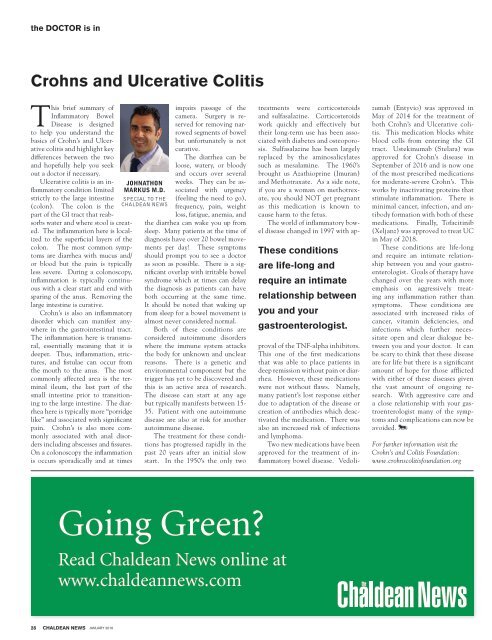JANUARY 2019
You also want an ePaper? Increase the reach of your titles
YUMPU automatically turns print PDFs into web optimized ePapers that Google loves.
the DOCTOR is in<br />
Crohns and Ulcerative Colitis<br />
This brief summary of<br />
Inflammatory Bowel<br />
Disease is designed<br />
to help you understand the<br />
basics of Crohn’s and Ulcerative<br />
colitis and highlight key<br />
differences between the two<br />
and hopefully help you seek<br />
out a doctor if necessary.<br />
Ulcerative colitis is an inflammatory<br />
condition limited<br />
strictly to the large intestine<br />
(colon). The colon is the<br />
part of the GI tract that reabsorbs<br />
water and where stool is created.<br />
The inflammation here is localized<br />
to the superficial layers of the<br />
colon. The most common symptoms<br />
are diarrhea with mucus and/<br />
or blood but the pain is typically<br />
less severe. During a colonoscopy,<br />
inflammation is typically continuous<br />
with a clear start and end with<br />
sparing of the anus. Removing the<br />
large intestine is curative.<br />
Crohn’s is also an inflammatory<br />
disorder which can manifest anywhere<br />
in the gastrointestinal tract.<br />
The inflammation here is transmural,<br />
essentially meaning that it is<br />
deeper. Thus, inflammation, strictures,<br />
and fistulae can occur from<br />
the mouth to the anus. The most<br />
commonly affected area is the terminal<br />
ileum, the last part of the<br />
small intestine prior to transitioning<br />
to the large intestine. The diarrhea<br />
here is typically more “porridge<br />
like” and associated with significant<br />
pain. Crohn’s is also more commonly<br />
associated with anal disorders<br />
including abscesses and fissures.<br />
On a colonoscopy the inflammation<br />
is occurs sporadically and at times<br />
impairs passage of the<br />
camera. Surgery is reserved<br />
for removing narrowed<br />
segments of bowel<br />
but unfortunately is not<br />
curative.<br />
The diarrhea can be<br />
loose, watery, or bloody<br />
and occurs over several<br />
weeks. They can be associated<br />
with urgency<br />
(feeling the need to go),<br />
frequency, pain, weight<br />
loss, fatigue, anemia, and<br />
the diarrhea can wake you up from<br />
sleep. Many patients at the time of<br />
diagnosis have over 20 bowel movements<br />
per day! These symptoms<br />
should prompt you to see a doctor<br />
as soon as possible. There is a significant<br />
overlap with irritable bowel<br />
syndrome which at times can delay<br />
the diagnosis as patients can have<br />
both occurring at the same time.<br />
It should be noted that waking up<br />
from sleep for a bowel movement is<br />
almost never considered normal.<br />
Both of these conditions are<br />
considered autoimmune disorders<br />
where the immune system attacks<br />
the body for unknown and unclear<br />
reasons. There is a genetic and<br />
environmental component but the<br />
trigger has yet to be discovered and<br />
this is an active area of research.<br />
The disease can start at any age<br />
but typically manifests between 15-<br />
35. Patient with one autoimmune<br />
disease are also at risk for another<br />
autoimmune disease.<br />
The treatment for these conditions<br />
has progressed rapidly in the<br />
past 20 years after an initial slow<br />
start. In the 1950’s the only two<br />
JOHNATHON<br />
MARKUS M.D.<br />
SPECIAL TO THE<br />
CHALDEAN NEWS<br />
These conditions<br />
are life-long and<br />
require an intimate<br />
relationship between<br />
you and your<br />
gastroenterologist.<br />
treatments were corticosteroids<br />
and sulfasalazine. Corticosteroids<br />
work quickly and effectively but<br />
their long-term use has been associated<br />
with diabetes and osteoporosis.<br />
Sulfasalazine has been largely<br />
replaced by the aminosalicylates<br />
such as mesalamine. The 1960’s<br />
brought us Azathioprine (Imuran)<br />
and Methotraxate. As a side note,<br />
if you are a woman on methotrexate,<br />
you should NOT get pregnant<br />
as this medication is known to<br />
cause harm to the fetus.<br />
The world of inflammatory bowel<br />
disease changed in 1997 with approval<br />
of the TNF-alpha inhibitors.<br />
This one of the first medications<br />
that was able to place patients in<br />
deep remission without pain or diarrhea.<br />
However, these medications<br />
were not without flaws. Namely,<br />
many patient’s lost response either<br />
due to adaptation of the disease or<br />
creation of antibodies which deactivated<br />
the medication. There was<br />
also an increased risk of infections<br />
and lymphoma.<br />
Two new medications have been<br />
approved for the treatment of inflammatory<br />
bowel disease. Vedolizumab<br />
(Entyvio) was approved in<br />
May of 2014 for the treatment of<br />
both Crohn’s and Ulcerative colitis.<br />
This medication blocks white<br />
blood cells from entering the GI<br />
tract. Ustekinumab (Stelara) was<br />
approved for Crohn’s disease in<br />
September of 2016 and is now one<br />
of the most prescribed medications<br />
for moderate-severe Crohn’s. This<br />
works by inactivating proteins that<br />
stimulate inflammation. There is<br />
minimal cancer, infection, and antibody<br />
formation with both of these<br />
medications. Finally, Tofacitinib<br />
(Xeljanz) was approved to treat UC<br />
in May of 2018.<br />
These conditions are life-long<br />
and require an intimate relationship<br />
between you and your gastroenterologist.<br />
Goals of therapy have<br />
changed over the years with more<br />
emphasis on aggressively treating<br />
any inflammation rather than<br />
symptoms. These conditions are<br />
associated with increased risks of<br />
cancer, vitamin deficiencies, and<br />
infections which further necessitate<br />
open and clear dialogue between<br />
you and your doctor. It can<br />
be scary to think that these disease<br />
are for life but there is a significant<br />
amount of hope for those afflicted<br />
with either of these diseases given<br />
the vast amount of ongoing research.<br />
With aggressive care and<br />
a close relationship with your gastroenterologist<br />
many of the symptoms<br />
and complications can now be<br />
avoided.<br />
For further information visit the<br />
Crohn’s and Colitis Foundation:<br />
www.crohnscolitisfoundation.org<br />
Going Green?<br />
Read Chaldean News online at<br />
www.chaldeannews.com<br />
28 CHALDEAN NEWS <strong>JANUARY</strong> <strong>2019</strong>

















